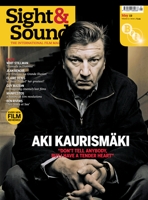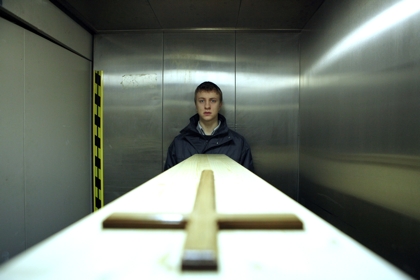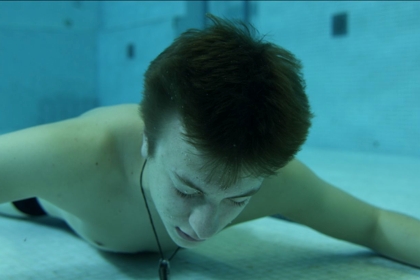Primary navigation


Karl Markovics’ debut study of an institutionalised teenager finding release in mortuary work takes several leaves from the Dardennes’ neorealist playbook. Catherine Wheatley sees muted naturalism turn to the sublime
from our May 2012 issue
A stark, self-effacing portrait of a young man at the fringes of society, actor Karl Markovics’s directorial debut will undoubtedly invite comparisons with Samantha Morton’s The Unloved and Andrea Arnold’s Fish Tank (both 2009), as well as with their antecedent, Lynne Ramsay’s Ratcatcher (1999). But it is with the films of the Dardenne brothers, most notably The Son (2002), that Breathing has most in common. Reversing the premise of that film – in which Olivier Gourmet’s carpenter took on his son’s young murderer as an apprentice – Breathing centres on 19-year-old Roman’s search for a job after spending four years in a juvenile detention centre for killing a boy in a brawl (“I didn’t murder him, he died in hospital,” he asserts).
The film opens in a metalwork factory, where the constantly clanging machinery overwhelms any clear view of the individuals who work there: only when we move into the car park outside do we zoom in on our protagonist, a blank-faced man-boy who, filmed from a distance, is marked out as an adolescent only by his bow-legged, puff-chested teenage swagger.
At the detention centre, Roman lives an almost catatonic existence: smoking, reading, catching daily buses to his work-release placements, resignedly submitting to the indignity of daily strip searches. His habit (one could hardly call it a passion) of swimming provides the film’s central metaphor – raised from birth in institutions, Roman has been living an underwater existence but is perhaps, finally, surfacing for air – as well as a starkly moving illustration of his isolation. As we float beneath the pool’s surface with Roman, a series of bleached-out pairs of calves line up along the side, a metonymic reference to the boys who won’t enter the water until he has left.

Since Roman knows little of life outside care homes and prison, it’s small wonder that his attempts to find a day-release job are self-sabotaging. Nor is it particularly surprising that it is at the city morgue, a state institution populated with bodies whose physical lifelessness echoes his emotional numbness, that he finally finds a job he can stick with. Here he begins to move beyond the liminal space he has so long inhabited, looking forwards to a life after prison, but also backwards, as he seeks out the mother who abandoned him at birth and comes to terms with his youthful crime.
Markovics has absorbed the Dardennes’ intensely naturalistic style, along with their obsessive eye for the details of menial labour. A finely calibrated sequence at the film’s mid-point sees Roman and his colleagues servicing the body of an elderly lady, dead on her kitchen floor. The efficiency with which they haul her to the bed, strip and sponge her down before neatly reclothing her and tidying away could so easily have seemed callous, but it is tempered by such an infinitessimal measure of tenderness that it emerges as a rather beautiful piece of filmmaking. Its delicacy is matched by a later scene in which Roman’s mother admits her reasons for giving him away: filmed at a distance, side by side against the plaque-coloured tiles of a railway station, the pair make no recriminations, beg no forgiveness. In keeping with the film’s neorealist bent, even catharsis is muted.
Since Roman is in every scene and almost every shot, much is asked of non-professional actor Thomas Schubert and – despite some typically elegant camerawork from Martin Gschlacht, the go-to cinematographer for classy Austrian filmmaking – it is ultimately his performance that raises the film to the level of the sublime. As the camera pulls back and tilts up in the film’s final shot, rising over the cemeteries and suburbs to take in the Vienna skyline, the future looks bright for Roman and Markovics alike.
Lourdes reviewed by Michael Brooke (April 2010)
Weight of water: Jonathan Romney on the Dardennes (April 2006)
The Son reviewed by Richard Kelly (March 2003)
Ratcatcher reviewed by Charlotte O’Sullivan (November 1999)